21世纪大学实用英语综合教程(第二册第1-4单元)-PPT文档
21世纪大学实用英语综合教程(第二册)课文翻译及课后习题答案unit-1
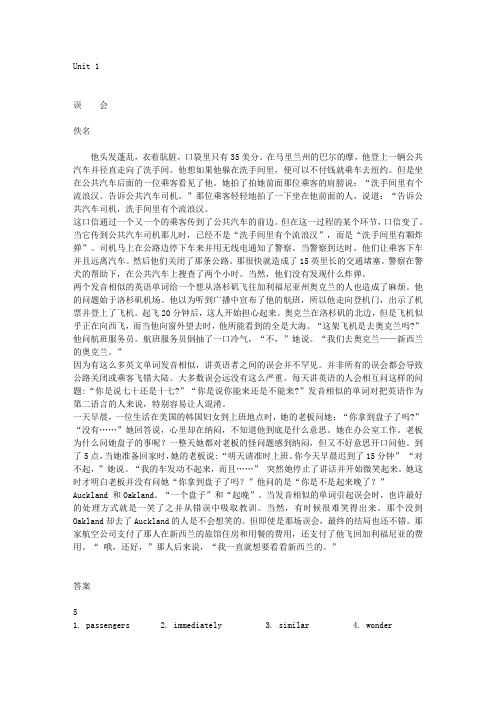
Unit 1误会佚名他头发蓬乱,衣着肮脏,口袋里只有35美分。
在马里兰州的巴尔的摩,他登上一辆公共汽车并径直走向了洗手间。
他想如果他躲在洗手间里,便可以不付钱就乘车去纽约。
但是坐在公共汽车后面的一位乘客看见了他。
她拍了拍她前面那位乘客的肩膀说:“洗手间里有个流浪汉。
告诉公共汽车司机。
”那位乘客轻轻地拍了一下坐在他前面的人,说道:“告诉公共汽车司机,洗手间里有个流浪汉。
这口信通过一个又一个的乘客传到了公共汽车的前边。
但在这一过程的某个环节,口信变了。
当它传到公共汽车司机那儿时,已经不是“洗手间里有个流浪汉”,而是“洗手间里有颗炸弹”。
司机马上在公路边停下车来并用无线电通知了警察。
当警察到达时,他们让乘客下车并且远离汽车。
然后他们关闭了那条公路。
那很快就造成了15英里长的交通堵塞。
警察在警犬的帮助下,在公共汽车上搜查了两个小时。
当然,他们没有发现什么炸弹。
两个发音相似的英语单词给一个想从洛杉矶飞往加利福尼亚州奥克兰的人也造成了麻烦。
他的问题始于洛杉矶机场。
他以为听到广播中宣布了他的航班,所以他走向登机门,出示了机票并登上了飞机。
起飞20分钟后,这人开始担心起来。
奥克兰在洛杉矶的北边,但是飞机似乎正在向西飞,而当他向窗外望去时,他所能看到的全是大海。
“这架飞机是去奥克兰吗?”他问航班服务员。
航班服务员倒抽了一口冷气,“不,”她说。
“我们去奥克兰——新西兰的奥克兰。
”因为有这么多英文单词发音相似,讲英语者之间的误会并不罕见。
并非所有的误会都会导致公路关闭或乘客飞错大陆。
大多数误会远没有这么严重。
每天讲英语的人会相互问这样的问题:“你是说七十还是十七?”“你是说你能来还是不能来?”发音相似的单词对把英语作为第二语言的人来说,特别容易让人混淆。
一天早晨,一位生活在美国的韩国妇女到上班地点时,她的老板问她:“你拿到盘子了吗?” “没有……”她回答说,心里却在纳闷,不知道他到底是什么意思。
她在办公室工作。
老板为什么问她盘子的事呢?一整天她都对老板的怪问题感到纳闷,但又不好意思开口问他。
21世纪大学实用英语综合教程第二册Unit1(可编辑修改word版)
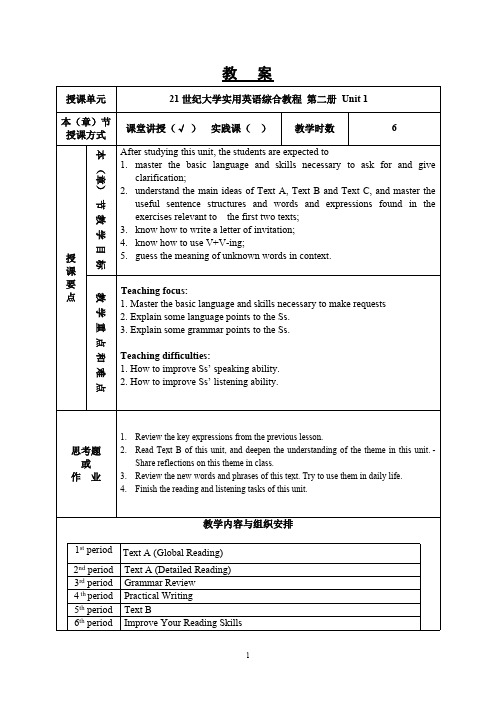
教案授课单元21世纪大学实用英语综合教程第二册Unit 1本(章)节授课方式课堂讲授(√)实践课()教学时数6本(章)节教学目标After studying this unit, the students are expected to1.master the basic language and skills necessary to ask for and giveclarification;2.understand the main ideas of Text A, Text B and Text C, and master theuseful sentence structures and words and expressions found in the exercises relevant to the first two texts;3.know how to write a letter of invitation;4.know how to use V+V-ing;5.guess the meaning of unknown words in context.授课要点教学重点和难点Teaching focus:1. Master the basic language and skills necessary to make requests2. Explain some language points to the Ss.3. Explain some grammar points to the Ss.Teaching difficulties:1. How to improve Ss’ speaking ability.2. How to improve Ss’ listening ability.思考题或作业1.Review the key expressions from the previous lesson.2.Read Text B of this unit, and deepen the understanding of the theme in this unit. -Share reflections on this theme in class.3.Review the new words and phrases of this text. Try to use them in daily life.4.Finish the reading and listening tasks of this unit.教学内容与组织安排1st period Text A (Global Reading)2nd period Text A (Detailed Reading)3rd period Grammar Review4 th period Practical Writing5th period Text B6th period Improve Your Reading Skills1st period Text A (Global Reading)1 Background InformationEnglish LanguageThe English language is the most widely spoken language in the world. It is used as either a primary or secondary language in many countries.During the 1500s, fewer than 2 million people spoke English. All of them lived in what is now Great Britain. Through the centuries, as the result of various historical events, English spread throughout the world. Today, about 400 million people speak English as their native language. Most of them live in Australia, Canada, Great Britain, Ireland, New Zealand, South Africa, and the United States.Another 100 million people living chiefly in Bangladesh, India, Pakistan, and in many African countries speak English in addition to their own language. An additional 200 million people probably know at least some English. (From the 1998 World Book Multimedia Encyclopedia)Characteristics of EnglishVocabulary. English has a larger vocabulary than any other language. There are more than 600,000 words in the largest dictionaries of the English language.Some English words have been passed on from generation to generation as far back as scholars can trace. These words, such as woman, man, sun, hand, love, go, and eat, express basic ideas and feelings. Later, many words were borrowed from other languages, including Arabic, French, German, Greek, Italian, Latin, Russian, and Spanish. For example, algebra is from Arabic, fashion from French, piano from Italian, and canyon from Spanish.A number of words, such as doghouse and splashdown, were formed by combining other words. New words were also created by blending words. For example, motor and hotel were blended into motel. Words can be shortened to form new words, as was done with history to form story. Words called acronyms are formed by using the first letter or letters of several words. The word radar is an acronym for radio detection and ranging.Pronunciation and spelling in English sometimes seem illogical or inconsistent. Many words are spelled similarly though pronounced differently. Examples include cough, though, and through. Other words, such as blue, crew, to, too, and shoe, have similar pronunciations but are spelled differently. Many of these variations show changes that occurred during the development of English. The spelling of some words remained the same through the centuries, though their pronunciation changed.Grammar is the set of principles used to create sentences. These principles define the elements used to assemble sentences and the relationships between the elements. The elements include parts of speech and inflections.Parts of speech are the word categories of the English language. Scholars do not all agree on how to describe the parts of speech. The traditional description listseight classes: nouns, pronouns, verbs, adjectives, adverbs, prepositions, conjunctions, and interjections. The most important relationships of the parts of speech include subject and verb, verb and predicate, and modifier and the word modified.English has fewer inflections than most other European languages. An English noun has only two inflections, the plural and the possessive. Inflections are used to change the tense and number of a verb or the case of a pronoun. Inflections can change adjectives to the comparative or the superlative — for example, big, bigger, biggest.American EnglishAmerican English is a variety of the English language spoken in the United States. Although all Americans do not speak the same way, their speech has enough in common that American English can be recognized as a variety of English distinct from British English, Australian English, and other national varieties. American English has grown up with the country. It began to diverge from British English during its colonial beginnings and acquired regional differences and ethnic flavor during the settlement of the continent.Today it influences other languages and other varieties of English because it is the medium by which the attractions of American culture — its literature, motion pictures, and television programs — are transmitted to the world.Characteristics of American EnglishA. PronunciationIn broad terms, Canadian and American speakers tend to sound like one another. They also tend to sound different from a large group of English speakers who sound more British, such as those in Australia, New Zealand, and South Africa. For example, most Canadians and Americans pronounce an r sound after the vowel in words like barn, car,and farther, while speakers from the British English group do not. Also, some British English speakers drop h sounds at the beginning of words, so that he and his are pronounced as if they were spelled ee and is. The English spoken in Australia, New Zealand, and South Africa sounds more like British English than American English does because these varieties have had less time to diverge from British English. The process of separate development began later in these countries than in North America.In some cases there are differences between American English and British English in the rhythm of words. British speakers seem to leave out a syllable in words like secretary, as if it were spelled secretry, while Americans keep all the syllables. The opposite is true of other words, such as specialty, which Americans pronounce with three syllables (spe-cial-ty) while British speakers pronounce it with five syllables (spe-ci-al-i-ty). Vowels and consonants may also have different pronunciations. British speakers pronounce zebra to rhyme with Debra, while American speakers make zebra rhyme with Libra. Canadian and British speakers pronounce the word schedule as if it began with an sh sound, while Americans pronounce it as if it began with an sk sound.B. WordsThe most frequently used words are shared by speakers of different varieties of English. These words include the most common nouns, the most common verbs, and most function words (such as pronouns, articles, and prepositions). The different varieties of English do, however, use different words for many words that are slightly less common — for example, British crisps for American potato chips, Australian billabong for American pond, and Canadian chesterfield for American sofa. It is even more common for the same word to exist with different meanings in different varieties of English.Corn is a general term in Britain, for which Americans use grain, while corn in American English is a specific kind of grain. The word pond in British English usually refers to an artificial body of water, whereas ponds also occur naturally in North America. British English chemist is the same as American English drugstore, and in Canada people go to the druggist. Many of the words most easily recognized as American in origin are associated with aspects of American popular culture, such as gangster or cowboy.C. SpellingAmerican English spelling differs from British English spelling largely because of one man, American lexicographer Noah Webster. In addition to his well-known An American Dictionary of the English Language (1828), Webster published The American Spelling Book (1783, with many subsequent editions), which became one of the most widely used schoolbooks in American history. Webster’s books sought to standardize spelling in the United States by promoting the use of an American language that intentionally differed from British English. The development of a specifically American variety of English mirrored the newcountry’s separate political development. Webster’s most successful changes were spellings with or instead of our (honor, labor for the British honour, labour); with er instead of re (center, theater for the British centre, theatre); with an s instead of a c (defense, license for the British defence, licence); with a final ck instead of que (check, mask for the British cheque, masque); and without a final k (traffic, public, now also used in British English, for the older traffick, publick). Later spelling reform created a few other differences, such as program for British programme. Canadian spelling varies between the British and American forms, more British in eastern Canada and more American in western Canada.2. Group DiscussionHave you ever had an experience in which you are misunderstood or have failed to understand others? Misunderstandings can result from the spoken form or written form of the language that you use.2nd period Text A (Detailed Reading)Words and Expressions & Difficult Sentences1) misunderstanding: n. (an example of) wrong understanding 误解,误会e.g. Her poor French often leads to misunderstandings when she visits France. misunderstand: vt. understand wrongly 误解e.g. I’m sorry, I misunderstood you.It seems that you have misunderstood what I said at the meeting.2) get on: board (a bus, a train, etc.)登上(公共汽车、火车等)e.g. When I got on the bus, I found all the seats were occupied.They felt worried when they realized that they had got on the wrong train.3) head for: go towards 向…走去;朝…行进e.g. The ship was heading for Britain.He headed for the bus stop.4) … he could ride to New York without paying.介词without 解释为“不、未”,其后跟动词时,须用V-ing形式。
21世纪大学英语2册1、2、4、5单元教案
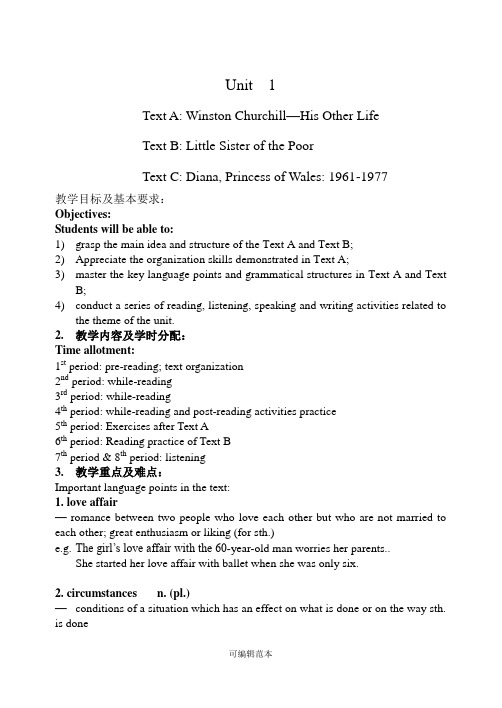
Unit 1Text A: Winston Churchill—His Other LifeText B: Little Sister of the PoorText C: Diana, Princess of Wales: 1961-1977教学目标及基本要求:Objectives:Students will be able to:1)grasp the main idea and structure of the Text A and Text B;2)Appreciate the organization skills demonstrated in Text A;3)master the key language points and grammatical structures in Text A and TextB;4)conduct a series of reading, listening, speaking and writing activities related tothe theme of the unit.2. 教学内容及学时分配:Time allotment:1st period: pre-reading; text organization2nd period: while-reading3rd period: while-reading4th period: while-reading and post-reading activities practice5th period: Exercises after Text A6th period: Reading practice of Text B7th period & 8th period: listening3. 教学重点及难点:Important language points in the text:1. love affair— romance between two people who love each other but who are not married to each other; great enthusiasm or liking (for sth.)e.g. The girl’s love affair with the 60-year-old man worries her parents..She started her love affair with ballet when she was only six.2. circumstances n. (pl.)—conditions of a situation which has an effect on what is done or on the way sth. is donee.g. In some circumstances it may be necessary for the manager to come here in person.Even under the most favorable circumstances this is not easy.3. mission n.—an important job sb. is sent to do in another place, esp. for a military or political purposee.g. The foreign minister’s missi on to Paris is to negotiate a cease-fire.It is his sole mission to expand the company’s business abroad.4.price n.—what must be given, done, or undergone to obtain or compensate for sth.e.g. We paid a heavy price for the victory, for we lost 10,000 soldiers.Translate : This is a small price to pay for independence.Key: 这是为独立付出的小小代价。
21世纪大学生英语2ppt课件

prime minister author painteWar I romantic fearless passionate
serious
World War II
Pre-reading Activities
First Listening:
You’re about to hear a conversation about Winston Churchill. Before you listen to the recording, take a look at the words below. Which ones do you think you’re likely to hear when people discuss Churchill? Then, as you listen to the recording the first time, circle the words you hear.
2. What about his personality? 3. What do you know about Winston Churchill and the two World
Wars?
Pre-reading Activities
First Listening:
You’re about to hear a conversation about Winston Churchill. Before you listen to the recording, take a look at the words below. Which ones do you think you’re likely to hear when people discuss Churchill? Then, as you listen to the recording the first time, circle the words you hear.
21世纪大学实用英语综合教程第二册第1单元PPT幻灯片
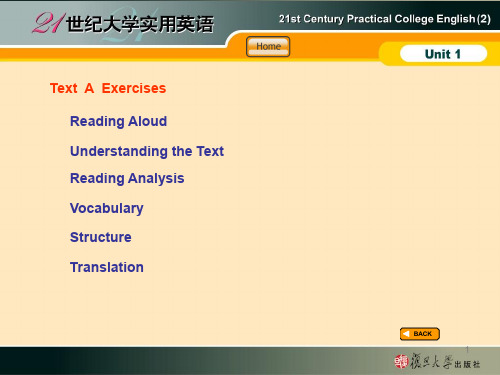
Part Ⅰ
Toபைடு நூலகம்ic
Misunderstandings may occur among native English speakers.
Paragraph 1 2
3
Supporting Details
A passenger wanted to tell the driver _th_a_t_t_h_e_re__w_a_s__a_b_u_m__i_n _th_e__re_s_t_ro_o_m__.
2. What can you do to avoid the serious consequences (后果) of misunderstandings caused by confusing words or expressions?
PREV.
BACK
4
Reading Analysis
Read Text A again and complete the following table.
and what had it turned into when it reached the driver? 5. What was the result of the wrong message? 6. Where did the man in Los Angeles want to go and where did he arrive? 7. What was the cause of his mistake?
BACK
2
Understanding the Text
Answer the following questions.
1. What is the text mainly about? 2. Why did the man with uncombed hair and dirty clothes head straight for
21世纪大学实用英语综合教程(第二册)
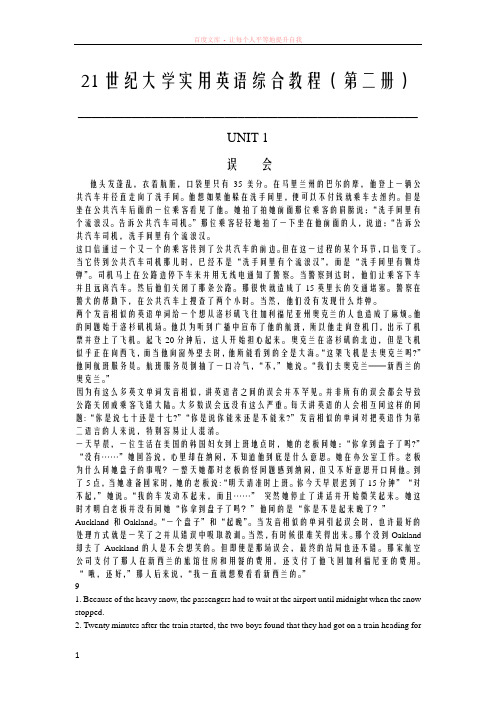
21世纪大学实用英语综合教程(第二册)___________________________________________________UNIT 1误会他头发蓬乱,衣着肮脏,口袋里只有35美分。
在马里兰州的巴尔的摩,他登上一辆公共汽车并径直走向了洗手间。
他想如果他躲在洗手间里,便可以不付钱就乘车去纽约。
但是坐在公共汽车后面的一位乘客看见了他。
她拍了拍她前面那位乘客的肩膀说:“洗手间里有个流浪汉。
告诉公共汽车司机。
”那位乘客轻轻地拍了一下坐在他前面的人,说道:“告诉公共汽车司机,洗手间里有个流浪汉。
这口信通过一个又一个的乘客传到了公共汽车的前边。
但在这一过程的某个环节,口信变了。
当它传到公共汽车司机那儿时,已经不是“洗手间里有个流浪汉”,而是“洗手间里有颗炸弹”。
司机马上在公路边停下车来并用无线电通知了警察。
当警察到达时,他们让乘客下车并且远离汽车。
然后他们关闭了那条公路。
那很快就造成了15英里长的交通堵塞。
警察在警犬的帮助下,在公共汽车上搜查了两个小时。
当然,他们没有发现什么炸弹。
两个发音相似的英语单词给一个想从洛杉矶飞往加利福尼亚州奥克兰的人也造成了麻烦。
他的问题始于洛杉矶机场。
他以为听到广播中宣布了他的航班,所以他走向登机门,出示了机票并登上了飞机。
起飞20分钟后,这人开始担心起来。
奥克兰在洛杉矶的北边,但是飞机似乎正在向西飞,而当他向窗外望去时,他所能看到的全是大海。
“这架飞机是去奥克兰吗?”他问航班服务员。
航班服务员倒抽了一口冷气,“不,”她说。
“我们去奥克兰——新西兰的奥克兰。
”因为有这么多英文单词发音相似,讲英语者之间的误会并不罕见。
并非所有的误会都会导致公路关闭或乘客飞错大陆。
大多数误会远没有这么严重。
每天讲英语的人会相互问这样的问题:“你是说七十还是十七?”“你是说你能来还是不能来?”发音相似的单词对把英语作为第二语言的人来说,特别容易让人混淆。
一天早晨,一位生活在美国的韩国妇女到上班地点时,她的老板问她:“你拿到盘子了吗?”“没有……”她回答说,心里却在纳闷,不知道他到底是什么意思。
21世纪大学实用英语综合教程第2册

Cats are common pets in England.
T 猫是英国的常见宠物。
It is quite common for him to talk in his sleep.
T 他常在睡梦中讲话。
The garden is common land.
T 公园是公有土地。
We have a common purpose.
to you. I even asked my friend about how to tell you this — you see, I think you’re a nice guy but I don’t want to date you.”
?
PREV.
NEXT
Text A
4 Honesty makes things so simple.N It’s not that humanity will love you more if you don’t tell lies, but that honesty, with tact, is the easiest
21世纪大学实用英语
21 世纪大学实用英语
综 合 教 程(第二册)
Objectives
Unit7
1
master the basic language and skills necessary to fulfill obligations;
2
understand the main ideas of Text A and master the useful sentence structures and words and expressions;
Jane and I have much in common. = I have much in common with Jane.
21世纪大学英语2册1、2、4、5单元教案

Unit 1Text A: Winston Churchill—His Other LifeText B: Little Sister of the PoorText C: Diana, Princess of Wales: 1961-1977教学目标及基本要求:Objectives:Students will be able to:1)grasp the main idea and structure of the Text A and Text B;2)Appreciate the organization skills demonstrated in Text A;3)master the key language points and grammatical structures in TextA and Text B;4)conduct a series of reading, listening, speaking and writingactivities related to the theme of the unit.2. 教学内容及学时分配:Time allotment:1st period: pre-reading; text organization2nd period: while-reading3rd period: while-reading4th period: while-reading and post-reading activities practice5th period: Exercises after Text A6th period: Reading practice of Text B7th period & 8th period: listening3. 教学重点及难点:Important language points in the text:1. love affair—romance between two people who love each other but who are not married to each other; great enthusiasm or liking (for sth.). The girl’s love affair with the 60-year-old man worries her parents..She started her love affair with ballet when she was only six.2. circumstances n. (pl.)—conditions of a situation which has an effect on what is done oron the way sth. is done. In some circumstances it may be necessary for the manager to come here in person.Even under the most favorable circumstances this is not easy.3. mission n.—an important job sb. is sent to do in another place, esp. for a military or political purpose. The foreign minister’s mission to Par is is to negotiate a cease-fire.It is his sole mission to expand the company’s business abroad.4.price n.—what must be given, done, or undergone to obtain or compensate for sth.. We paid a heavy price for the victory, for we lost 10,000 soldiers. Translate : This is a small price to pay for independence.Key: 这是为独立付出的小小代价。
21世纪大学实用英语综合教程(第2册第1单元)
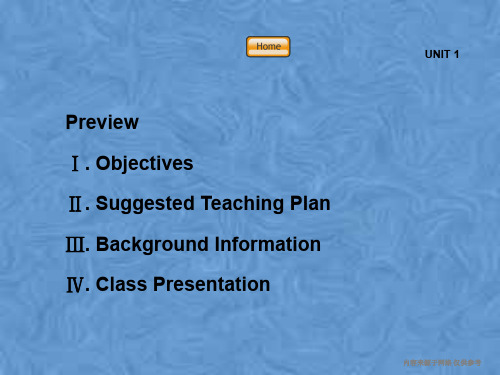
D. Now have them look for the language used to ask for and give clarification;
PREV.
NEXT
PREV.
NEXT
Time
Contents
UNIT 1
Plan
D. Ask other students to present their opinions on a particular subject or situation, trying to use the expressions learned in Ex. 1.
A. gives the students a few minutes to think about the questions in the starter;
B. asks some students to tell the others their responses. (10 minutes)
PREV.
NEXT
Time
Contents
UNIT 1
Plan
2) Text A
The teacher
A. lets the students answer the
text-related questions, helps
thf
each paragraph and analyzes
PREV.
NEXT
Time
Contents
Practical Writing
UNIT 1
Plan
2) Practical Writing The teacher tells as well as shows the students how to write an invitation by doing Ex.12 of Practical Writing, and then requires the students to do Ex.13 and Ex.14 as their homework.
21世纪大学实用英语综合教程(第二册)课文翻译及课后习题答案unit 1
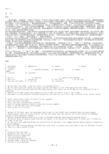
3. until they have finished their speeches
4. until my teacher explained them in class with several examples
5. until I saw Sam Ward leave the building
thorough (彻底的)。
还有一些完全没有道理的词,如:
1. “corned beef”(咸牛肉)中的“corn”( “玉米”) 在哪里?
2. “eggplant”(“茄子”)中的“egg” (“蛋”) 在哪里?
3. 为什么“grapefruit”(“柚子”)不是“fruit from the grape”(“葡萄的果实”)?
15
1. Take a look 2. get right 3. objected to 4. at least 5. makes no sense
6. beside himself 7. dawn on 8. think of
�
do(做)— dew(露水),
red(红的)— read(读过),
ate(吃过)— eight(八)。
为什么我们有拼写相同但发音不同、意义也不同的词?看看这些词中你能读对几个?
1. 比利将把自己的礼物赠送给汤姆。
2. 我反对把那样东西留在这里。
3. 我估计这一估计数会太高。
答案
5
1. passengers 2. immediately 3. similar 4. wonder 5. continent
6. traffic 7. misunderstandings 8. common
21世纪大学实用英语综合教程 第二册 Unit
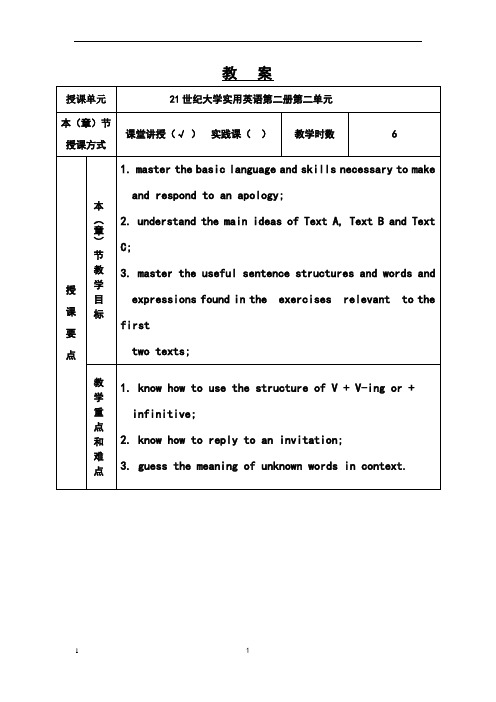
教案Teaching procedures:First PeriodContent:Unit 2 listening and speakingStep 1 Lead-inIn the Listening and Speaking section, you will learn the basic language and skills necessary to make and respond to an apology;Step 2 Listening and Speaking1) The Language for Making and Responding to an ApologyA. have a warm-up activity by asking Ss what they say when they cause trouble to others or make mistakes;B. have the Ss listen to Exercise 1 (1-3 times) and fill in the blanks with the missing words;C. ask one S to read aloud the talk so Ss can check their completed answers;D. ask other Ss to form responses to the apologies in Exercise2. trying to use the expression learned in Exercise 1.2) Making and Responding to an ApologyA.go through the new words in the 1st dialogue in Exercise 3;B. listen to the dialogue twice while filling in the missing words;C.ask Ss to answer the questions about the conversation by way of group discussion or the traditional teacher- student interaction;D.have them look for the language used to make and respond to an apology;E. Ss can role-play the dialogue;F. do the same with the second dialogueStep 3 Ask Ss to study the structures presented in Exercise 4, and create situations for dialogues in which Ss blame someone for his/her mistake or fault and expect them to make both apologies and excuses with the help of the language they have picked up in Exercise 1 and expressions from Exercise 4.Step 4 Listening PracticeA.Listen to the following people speaking and decide what they are talking about. (Each one will be given twice.)B Listen to the following five short dialogues and choose the appropriate answers.(Each one will be given twice.)C.Listen to the following short story twice. Listen carefully and decide whether the statements are true (T) or false (F) according to the story you have heard.D.Listen to the following talk and fill in the blanks with the missing words. (The talk is given twice.)E. Listen to the talk again and then answer the following questions orally.Answers to the listening practice5. C A D A B6. C A B D C7. T T F F T8. in a loud voice particularly interesting in the same room in curing them left alone a talk suffering from a delusion who are youStep 6 SummaryThere’re many ways of making an apology:—Excuse me for my interrupting you.—I’m really sorry for being late.—I’m terribly sorry to step on you.—I’ m awfully sorry (that) I have forgetten your name.— I apologize for what I have said.—I’m afraid I seem to have forgetten your birthday.— I owe you an apology for the delay.—I’m sorry. I didn’t mean to hurt your felling.— It was really quite unintentional.— I hope you excuse me.There are also many ways of responding to an apology:—That’s (quite) all right.—These things happen; it can’t be helped.—I quite understand. Please don’t worry.— (Oh well.) Not to worry.—No problem. Let’s forget it.Step 7 Homework assignment1. Form a dialogue with your classmates.2. preview the new lesson.Second PeriodContent:Unit 2 Text AStep1 Lead-in1. Have you ever been mistaken for someone else Or do you know someone who has been mistaken for another person Please share your story with your classmates.2. Now imagine you have the same name as the mayor of your city and look like him too. What might happen when you go to a hotel asking for a room and are told that the rooms are all bookedStep 2 Ask Ss to read the following passage and see what happened to Mark Twain when he tried to get a train ticket.Step 3 Introduce the Background InformationMark Twain (1835-1910)Mark Twain was the pen name of Samuel Langhorne Clemens, one of the major authors of American fiction. Twain is also considered the greatest humorist in American literature. Twain’s varied works include novels, travel narratives, short stories, sketches, and essays. His writings about the Mississippi River, such as The Adventures of Tom Sawyer, Life on the Mississippi, and Adventures of Huckleberry Finn, have been especially popular among modern readers. (From the 1998 World Book Encyclopedia)v1.0 可编辑可修改7-Eleven7-Eleven, Inc. is the world’s largest operator, franchiser and licensor of convenience stores with more than 24,000 units worldwide. Founded in Dallas, Texas in 1927 as an ice company, 7-Eleven pioneered the convenience store concept during its early years when its ice docks began selling milk, bread and eggs as a convenience to customers.The name 7-Eleven originated in 1946 when the stores were open from 7 a.m. until 11 . Today, offering customers 24hour convenience, seven days a week is the cornerstone of 7-Eleven’s business. Approximately 5,800 7-Eleven and other convenience stores are operated and franchised in the United States and Canada.Step 4 Listen to the whole text and answer some questions about the text.Step 5 Deal with some languages points1) I was to take the sleeper train there: I planned to take the sleeper train there.我计划在那儿搭乘卧车。
21世纪大学实用英语综合教程第二册第4单元共33页
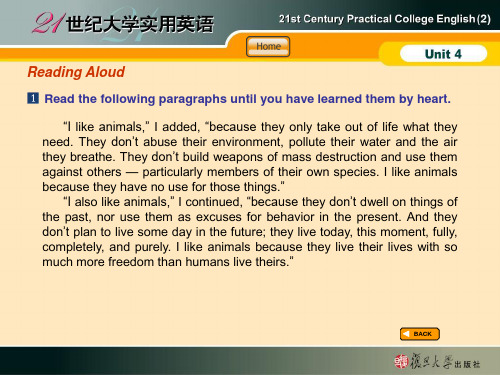
Now, if humans could only be like animals.
The conversation actually rolled into shared
stories of animals they’d known, stories of
animal _lo_y_a_lt_y_ and _in_t_e_lli_g_e_n_c_e_, their _h_u_m_o_r and _in_n_o_c_e_n_c_e_.
comment pretend pollute particularly freedom
despite enable cruel planet
argue
1.The zoo_e_n_a_b_le_s_ tourists to get a close look at wild animals. 2. When you’re trying to help someone, you don’t get anywhere by _a_r_g_u_in_g_ with
BACK
Understanding the Text
Answer the following questions
1. Why does the writer like animals? How did her family expect her to answer this question?
2. Why does the writer say that animals are honest? 3. When did this conversation take place? 4. According to the writer, how do animals treat the environment? 5. What difference lies between the writer and her sister as to why animals don’t
21世纪大学实用英语综合教程2 Unit 4课件
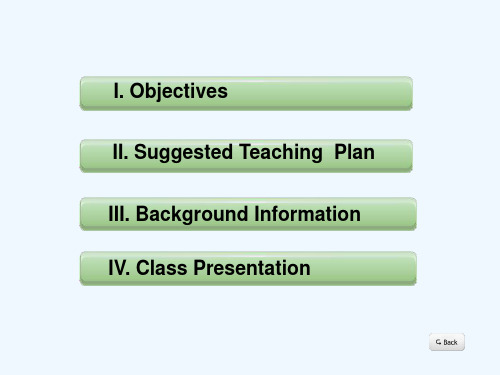
1 period Speaking
The teacher A. fully understands what the exeto do;
Time
Contents Speaking
Plan
B. in Ex. 1 asks class if there are some statements they are unfamiliar with for clarification, and then assign the match task to students before they speak each pair out as required (Be flexible with the match.);
C. asks a further question: Do you know what happened to the younger brother Nick?
Time
Contents
Text A & Textrelated Exercises
Plan
D. gives the students 10 minutes to read Text A and find out the answer from the text;
Contents Text B & Textrelated Exercises
Practical Reading
Plan
The teacher A. asks the students to go over the text and do
the multiple choice questions about it; B. lets the students do the vocabulary and
21世纪大学实用英语综合教程第二册课件
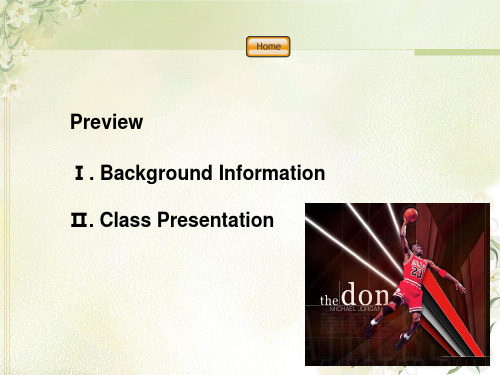
Ironically, in 1978, when Jordan attended Laney High School in Wilmington, North Carolina, he was cut from the varsity team. Instead of giving up, however, he fought through adversity and became the greatest basketball player in the world. Between the 10th and 11th grade, Jordan grew from 5’11” to 6’3”, and because he had improved greatly as a player, he made the varsity team the following year. Jordan played so well in his junior season that he was invited to attend the Five Star Camp in Pittsburgh, Pennsylvania, during the summer before his senior year. By the time Jordan was finishing his senior year at Laney, he had grown to 6’5” and attained a basketball scholarship from the University of North Carolina. Jordan’s ever-growing popularity began at UNC where he made a last minute game winning shot in the NCAA championship game. In the summer of 1984, Jordan played on the US Men’s Olympic Basketball Team under head coach Bobby Knight. The team had such college players as Jordan, Patrick Ewing, and Chris Mullin (NBA players weren’t allowed to compete in the Games until 1992). Jordan’s plays quickly awed the other teams.
21世纪大学实用英语综合教程第二册答案1~5单元含听力答案,原文翻译

21世纪大学实用英语综合教程第二册答案1~5单元含听力答案,原文翻译A 21世纪大学实用英语综合教程第二册答案1~5 Unit1.Listening & Speaking1, what has been said, mentioned earlier, two-way interaction, a breakdown, even confusion, a native speaker, going on3, 1), be fun, I don’t think, it depends, What’s that, what you mean, got it, what would you say;Tom Chang.It depends.He’ll tell them a little white lie.It’s an innocent social fib or excuse.Not mentioned.2), serious hearing problems, to hear 100%, is perfect, hear again, listen to the conversations, three times;What did you say? Would you speak louder please?No. I’ve been having serious hearing problems for years. I can’t hear people well. That’s why I’m here.What do you m ean by hearing aid? What’s that?Oh, I haven’t told my family yet. I just sit around and listen to the c onversations. You know what? I’ve changed my will three times!5, BADCA 6, DACCB 7, FTTFF8, complaining about, does everything, every 10 hours, every 2 hours, every 24 hours, in one hour, damn near, from down the hall, I just realized9, They are talking about Nurse Nancy.Because she did everything absolutely backwards.1)One doctor told her to give a patient 2 milligrams ofmorphine every 10 hours. She gave him 10 milligrams every 2 hours.2)The other doctor told her to give a petient an enema every 24 hours. She tried to give him 24 enemas in one hour.They heard a blood-curdling scream from down the hall.She was boiling a patient.A1误会他头发蓬乱,衣着肮脏,口袋里只有35美分。
- 1、下载文档前请自行甄别文档内容的完整性,平台不提供额外的编辑、内容补充、找答案等附加服务。
- 2、"仅部分预览"的文档,不可在线预览部分如存在完整性等问题,可反馈申请退款(可完整预览的文档不适用该条件!)。
- 3、如文档侵犯您的权益,请联系客服反馈,我们会尽快为您处理(人工客服工作时间:9:00-18:30)。
Wang Ying: I saw an ad for this movie called White Chicks. Have you heard about it?
Li Ming: Yes, I heard about it. And I saw an advertisement for it. Those guys look (3) a__li_tt_le__b_it_fu_n_n_y_ , actually, as girls.
As he was (10) _g_ro_w_i_n_g_u_p_ , Lenny taught himself how to play a number of musical instruments and sang in the famous California Boys Choir. He attended Beverley Hills High School but was not (11)a_n__e_x_c_e_ll_e_n_t _st_u_d_e_n_t . When he first heard the music of Prince he decided to drop the choir and (12)c_o_n_c_e_n_t_ra_t_e_o_n_ rock and roll. While still in high school, Lenny chose Romeo Blue as his (13) s_t_a_g_e_n_a_m__e and started performing locally. After graduating he was keen to (14) _fo_l_lo_w__a_c_a_r_e_e_r in music. Later Lenny dropped the name Romeo Blue and started performing (15) u_n_d_e_r_h_i_s_o_w__n_n_a_m__e . In 1989 Lenny released his first album, Let Love Rule, which was successful.
Li Ming: Sometimes those are (8) _th_e__m_o_s_t_f_u_n. When you don’t have to think about it, you just watch it.
PREV.
NEXT
Section B (7%)
Directions: Listen to the following short talk and fill in the blanks with the missing words. The talk will be read twice.
Lenny Kravitz was born on May 26th in New York. His mother was an actress and his father was a TV (9) n__e_w_s_p_r_o_d_u_c_e_r . When he was eleven years old, the family moved to Los Angeles.
(148 words)
PREV.
NEXT
Section C (10%)
Directions: Listen to the following short talk and fill in the missing information.
script
The talk will be read twice.
Part Ⅰ Listening (25%) Section A (8%)
Directions: Listen to the following conversation and fill in the blanks with the missing words.
Wang Ying: Are you ever (1) i_n_t_h_e_m__o_o_d_t_o_see some stupid new movie?
_p_h_o_n_e__ca__lls_ . 11:00 a.m. Attended a meeting. 1:00 p.m. Dealt with (17)_m__o_re__le_t_te_r_s_a_n_d__p_h_o_n_e_c_a_ll_s_. 1:45 p.m. (18) _H_a_d_a__q_u_ic_k__lu_n_c_h_. 2:30 p.m. Attended the Prime Minister’s question time. 3:30 p.m. (19)_W_e_n_t_t_o_t_h_e_l_ib_r_a_ry__to__w_r_ite__a_l_e_c_tu_r_e_. 5:00 p.m. Listened to (20)_t_h_e_d_i_sc_u_s_s_i_o_n_o_n__p_u_b_lic__e_d_u_c_a_ti_o_n_. 6:00 p.m. Signed letters, had a drink in the bar. 7:00 p.m. Drove home.
6:30 a.m. Got up, made breakfast, read the papers. 8:30 a.m. Dictated letters. 10:00 a.m. Drove to the office, (16) c_o_l_le_c_te_d__te_l_e_p_h_o_n_e_m__e_s_s_a_g_e_s_a_n_d__m_a_d_e__a_f_e_w
BACK
NEXT
Wang Ying: That’s true. I saw a review for it and it got (6) _t_h_re_e_ out of ten stars. But I still want to see it. I’m just kind of (7) _a_tt_ra_c_t_e_d_t_o_ crazy, dumb movies, something I don’t have to think about.
Wang Ying: They do. But (4) _th_e_r_e_’s_a_l_w_a_y_s_s_o_m__e_th_i_n_g_humorous about guys dressing up as girls.
Li Ming: Yຫໍສະໝຸດ s, (5) I_g_u_e_s_s_. If you find that entertaining.
